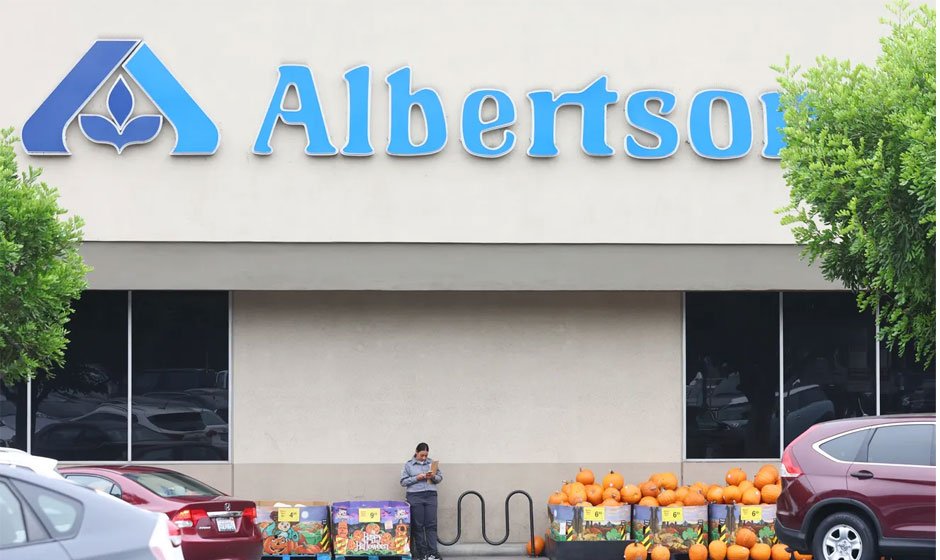The Albertsons-Kroger Merger Unveiled: A Transformative Grocery Landscape

In a groundbreaking move poised to reshape the grocery industry, Kroger recently announced its intention to acquire rival Albertsons in a monumental $24.6 billion deal. The merger, if approved by regulators, holds the promise of creating a grocery giant boasting nearly 5,000 stores and an annual revenue approaching $200 billion.
Photo: An Albertsons grocery store in Los Angeles, California on October 14, 2022.
Vision of Unity: Kroger and Albertsons Joining Forces
Kroger’s Chairman and CEO, Rodney McMullen, expressed the ambition to unite two purpose-driven organizations with a shared commitment to delivering superior value to customers, associates, communities, and shareholders. The strategic alliance aims to enhance competitiveness, particularly against industry titans like Walmart and Amazon. However, the proposal must undergo rigorous scrutiny from the Federal Trade Commission, as lawmakers voice concerns and advocate for regulatory intervention.
Consumer Impact: What the Merger Could Mean for Shoppers
1. Lowering Food Prices or Escalating Costs?
The companies assure consumers that Kroger plans to reinvest approximately $500 million in cost savings from the merger to reduce prices for customers. Additionally, a $1.3 billion investment in Albertsons is earmarked to enhance the overall customer experience. Despite these promises, experts and lawmakers express reservations about potential cost increases for shoppers, especially considering the current surge in food prices.
2. Historical Precedent and Consumer Concerns
Citing a 2008 study, skeptics highlight that in four out of five mergers evaluated, prices witnessed an increase between 3% and 7%. While the impact of each merger is unique, this historical precedent raises questions about the tangible benefits that consumers might experience. With the cost of food in the U.S. already escalating by 11% in the last month, any further price hikes could significantly impact consumers.
3. Reassurances from Kroger’s CEO
In response to concerns, Kroger’s CEO, Rodney McMullen, has sought to allay fears by assuring that the impact on consumers will be “very limited.” He emphasizes the potential for larger-scale investments in associates and competitive pricing for customers.
Operational Changes: Stores and Workforce
1. Store Closures and Workforce Dynamics
Currently employing over 710,000 people and operating nearly 5,000 stores across 48 states and Washington D.C., the combined entity will likely face regulatory demands for divestitures. Plans to divest 100 to 375 stores aim to satisfy regulators, with these stores forming a separate company under the Albertsons subsidiary. Concerns are raised about potential closures in overlapping areas, potentially exacerbating issues like food deserts.
The Road Ahead: Regulatory Scrutiny and Public Response
1. Timeline and Regulatory Review
The merger, anticipated to conclude in early 2024, hinges on regulatory approval following thorough antitrust reviews. Senators Bernie Sanders and Elizabeth Warren have called on the Federal Trade Commission (FTC) to reject the deal, expressing concerns about potential price hikes and workforce layoffs.
2. Senate Judiciary Antitrust Subcommittee Hearing
The Senate judiciary antitrust subcommittee has announced a hearing to scrutinize the proposed merger. Senators Amy Klobuchar and Mike Lee express serious concerns about maintaining competitiveness in the grocery industry to ensure affordability for American families.
3. Industry Consolidation and Consumer Advocacy
In an industry where over half of American grocery sales are concentrated among the top five grocers, including Walmart, Kroger, Amazon, Albertsons, and Ahold Delhaize, critics argue against allowing two major supermarket chains to merge. Consumer advocates caution against squeezing consumers, undermining fair wages for workers, and jeopardizing independent, community-based stores.
Conclusion: Balancing Growth with Consumer Welfare
As the Albertsons-Kroger merger enters the realm of regulatory scrutiny and public discourse, the grocery landscape stands at the crossroads of transformation. While the potential benefits of scale and competitiveness are touted, the concerns raised by lawmakers and experts underscore the delicate balance needed to ensure that this consolidation serves the best interests of both businesses and consumers.


